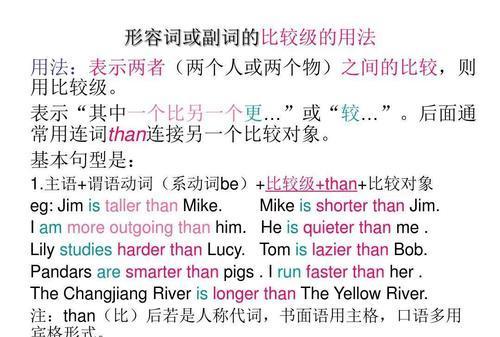英语语法中的比较级和最高级用于更准确地描述名词和形容词。比较级用于比较两个事物,通常在形容词或副词前加“-er”或“more”。最高级用于比较三个或更多事物,通常在形容词或副词前加“-est”或“most”。有些形容词和副词的比较级和最高级是不规则的。掌握比较级和最高级的用法可以帮助我们更准确地表达自己的意思。

比较级的用法
比较级通常用于将两个事物进行比较。它的构造方式是在形容词或副词前加上“-er”,或在前面加上“more”。例如:
- Tom is taller than Jerry. (汤姆比杰瑞高。)
- She runs faster than her sister. (她比她姐姐跑得快。)
- This book is more interesting than that one. (这本书比那本书更有趣。)
需要注意的是,有些形容词和副词的比较级是不规则的,例如“good”和“bad”:
- He is better than me at playing basketball. (他打篮球比我好。)
- This movie is worse than the last one. (这部电影比上一部更糟糕。)
最高级的用法
最高级通常用于将三个或以上的事物进行比较。它的构造方式是在形容词或副词前加上“-est”,或在前面加上“most”。例如:
- This is the tallest building in the city. (这是城市里最高的建筑。)
- She sings the most beautifully of all the contestants. (她是所有选手中唱得最美的。)
- The most important thing is to be happy. (最重要的事情是快乐。)
同样地,也有一些形容词和副词的最高级是不规则的:
- He is the best player on the team. (他是球队中最好的球员。)
- This is the worst day of my life. (这是我一生中最糟糕的一天。)

